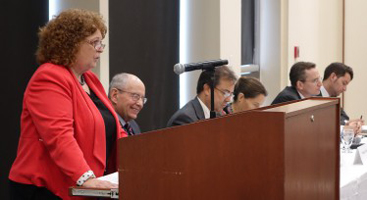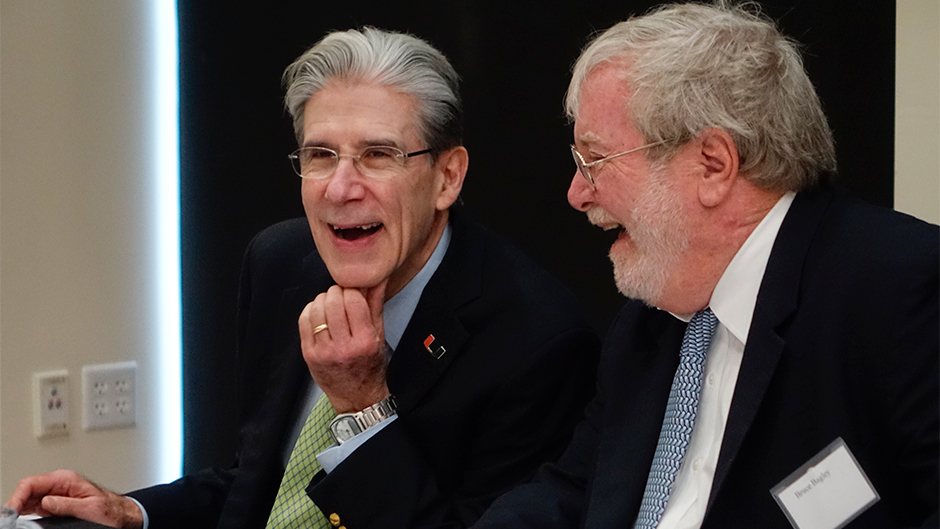With NASA predicting 2016 will be the hottest year on record, University of Miami President Julio Frenk opened the first day of an important energy and global warming conference last week by calling climate change the “quintessential relevant issue of our day.”
“Just a few weeks ago, annual king tides on Miami Beach and other low-lying areas of our community reached unprecedented heights due to sea-level rise, and we are seeing extreme weather events around the world become more frequent. The impact is all around us,” Frenk said, as the forum Consequences of the Fall: Energy Security, Sustainable Development, and Global Warming got underway in UM’s Newman Alumni Center last Thursday.
The three-day conference, which moved to Florida International University’s Management and Advanced Research Center Pavilion for day two and ended Saturday on UM’s Coral Gables campus, examined the impacts of climate change on energy—from the local level to governance in the developing world.
It also addressed the global effects of the dramatic plunge in oil prices two years ago, addressing topics such as hydrocarbons, renewable energy and sustainability, energy sector management, corruption, and best practices.
Over the years, the conference has shifted its focus from energy security to the future of energy production and distribution via renewable energy sources.
Stemming from the Department of International Studies Department in UM’s College of Arts and Sciences, the conference is truly interdisciplinary and global in reach, with dozens of scientists, practitioners, government officials, diplomats, and university leaders attending the event. Since the conference began four years ago, speakers from 21 different countries have participated.
“In perfect alignment with the University’s aspirations, particularly in the hemispheric and relevant categories, this conference provides a forum for a diverse set of experiences and expertise to cross-pollinate and create new opportunities for partnerships that strengthen the gene pool of knowledge,” said Frenk.
Echoing President Frenk’s opening remarks, Bruce Bagley, director of the conference and professor in the Program on International Studies in the College of Arts and Sciences, believes this year’s topics foster the University’s aspirations to be both hemispheric and relevant.
President Frenk also highlighted the University’s Climate Change Special Report as “a living platform for the exchange of ideas, as well as an incubator for new cross-disciplinary collaborations,” noting that the site has been used by the City of Miami’s Waterfront Advisory Board and Sea Level Rise Committee to help better understand the impacts of climate change.
Among the day one panels at UM was a discussion moderated by Miami-Dade County Chief Resilience Officer Jim Murley on global perspectives of climate change mitigation and adaptation strategies following the 21st Conference of the Parties (COP21) in Paris in 2015.
 |
| Consuls from Canada, the Netherlands, Mexico, France, and Germany discussed their countries’ post-COP21 strategies for combating climate change in a panel moderated by Jim Murley, Miami-Dade County Chief Resilience Officer |
Susan Harper, Consul General of Canada in Miami, Natalie Olijslager, Consul General of the Kingdom of the Netherlands in Miami, Jose Antonio Zabalgoitia, Consul General of Mexico in Miami, Clément Leclerc, Consul General of France in Miami, and Axel Zeissig, Vice Consul of Germany in Miami, participated on that panel.
The conference was sponsored by UM’s College of Arts and Sciences, the University of Miami Institute for the Americas, FIU’s Steven J. Green School of International and Public Affairs, FIU’s Kimberly Green Latin American and Caribbean Center, FIU’s Jack D. Gordon Institute for Public Policy, and the Zambrano Foundation, Inc.
View the agenda.
View the Facebook Live video with President Frenk's opening remarks.
For more information on the University of Miami’s work related to climate change and sustainability, visit Climate Change: A University of Miami Special Report.

